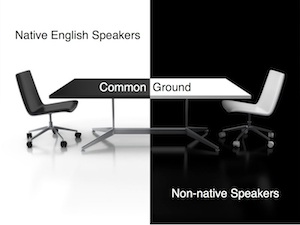Nov 02
2014
0
comments
Native English speakers must re-learn English

Ever felt anxious after communicating with your non-native English speaking global counterpart in fear that he/she didn’t fully understood you? If so, probably you’re right. She didn’t. But before you blame on her English proficiency, you might want to blame on yourself and consider re-learning how you communicate in English.
For the past three years, I have been training non-native business people (mainly Japanese) how to speak up and contribute in global business meetings. I always felt that it was the non-natives that need to learn how to speak-up to communicate effectively with native English speakers.
But recently, I found out that this only solves half of the problem. Yes, non-natives need to learn how to speak up but equally important, native English speakers must learn how to speak down, finding a mutual ground for effective communication which, will lead to better decision making.
From September, I am conducting a 8 week global communication training course for a large pharmaceutical company in Japan. Normally I only have Japanese employees participate but this time, I wanted to make the training environment more real so I asked other Asian, American, European colleagues to participate.
For each session, I split that group into two groups, assign each group with a topic to discuss about, record the discussion (usually 15 minutes) on video, have everyone come back and watch each group’s video recording together.
I’m always amazed on how much we learn from seeing ourselves on video. Of course we try learn from the obvious (body language, bad habits, what was said etc) but what I find more important is unveiling what was NOT seen/said during the discussion.
For example, during the first session, a poker faced Japanese participant (Non-native A), silent throughout the discussion, slightly moved his hand (just a couple of inches), which looked clear to me that he came up with an idea, during a heated discussion between two native speakers. I stopped the video, asked what the idea was which shocked the native English speakers since it was the quality idea that, if said, could have led the group to a more better solution.
Non-native A: I was waiting for the pause, the right moment, which never came.
Me: We (Japanese) consider it rude to interrupt someone when talking. So even we’re confused, we’re very likely to listen in until you finish talking. Native English speakers need to pay close attention to our body language.
Native A: But how can I pick those up? No way I could have sensed that one…
Non-native B: I sensed that hand movement too.
Non-native C: How about to make it a rule if someone senses the subtile cue, that person should voice that out?
 So born was “Rule #1″ in our global communication rulebook that we decided to create:
So born was “Rule #1″ in our global communication rulebook that we decided to create:Catching body language signals (For native English speakers)
- Do not assume that everyone is understanding even if non-native speakers don’t stop and clarify. More likely you’ve lost them.
- You need to slow down and use simpler words/phrases.
- When explaining something or getting into a heated discussion with other native English speakers, you’ve most likely lost your non-native colleagues/clients. How can you avoid this?
- Look around for someone who is not avoiding eye contact. Look for the nod or body language to make sure everyone is on board. If he/she stops nodding, engage the person by asking “Am I confusing you?”
Signaling with body language (For non-native English speakers)
- Never look down. Look at the person who is talking. Lean in. Don’t fold your arms in front of you.
- No poker face! Nod if you understand, tilt your head if you don’t. Try to make your body language larger so people can sense it.
For those who can detect subtle cues (For the highly skilled communicators)
- Whenever you sense subtle cues, whether it’s getting lost or coming up with an idea, help your peers by saying:
“I think you’re losing us here. So your point is ***, right?”
“I think ** came up with something or didn’t you?” - Act as gatekeepers.
To this date (we have two sessions left), we have “6 Rules” which we agreed on. I’ve seen drastic improvement in both sides as we try to find the middle ground for better communication. By practicing “Rule #1″ you’ll show that you care which will make non-natives feel more relaxed to speak-up.
English is becoming the defacto language in this global economy but this doesn’t mean that native English speakers have the advantage. According to a Newsweek article on June 21, 2010 titled “Glob-ish, English has evolved into the world’s language:”
…a French-speaking retired IBM executive had noticed that non-English speakers in the Far East communicated in English far more successfully with their Korean and Japanese clients than British or American executives.
I see this all the time. A couple of weeks ago, I sat in a global HR meeting for a US-based global company and quickly stopped the native English speaking boss at the beginning to clarify since I was 100% sure he lost over half of his subordinates within 5 minutes.
Yes, English might have won the global language war but has evolved into something different, a simple communication tool where non-natives can communicate successfully with each other. Emerging markets now account for more than half of world GDP (based on PPP, IMF report) and the game has changed. Native English speakers must re-learn how to communicate in English.

